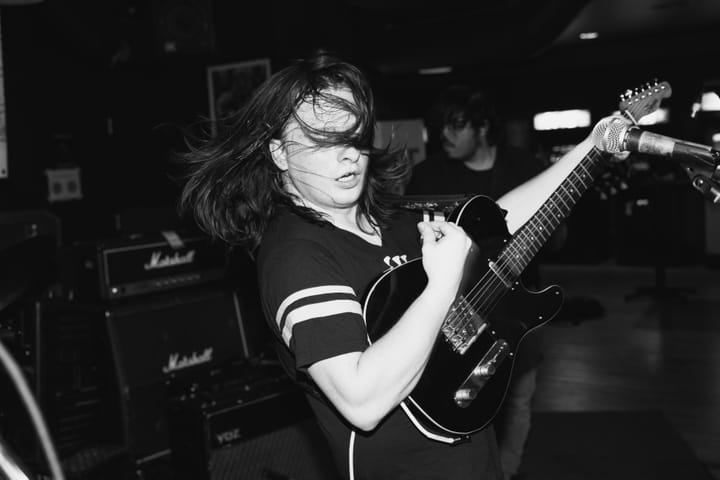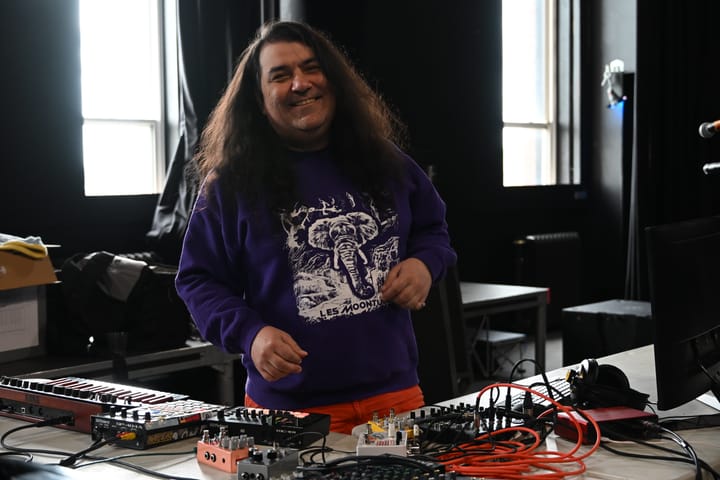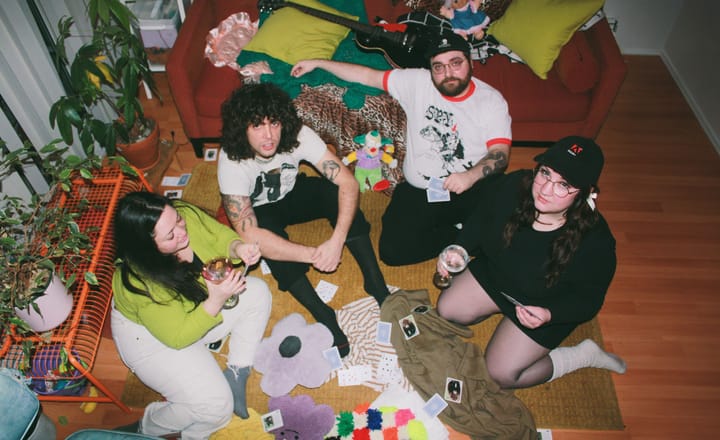
Ontario’s Cloud 9 Festival Offers a Glimpse of a Sustainable Future
For the second year in a row, this past September, Eastern Ontario’s Cloud 9 festival saw some 400 attendees converge on No. 9 Gardens for a weekend of electronic dance music, camping, and ecological dreaming. When I learned of the festival and its promise of “an immersive and multi-sensory celebration of a sustainable future” on a 40-acre sustainability centre in Rideau Lakes, I was all in. (A lineup boasting acts like Ciel and Korea Town Acid didn’t hurt.) At the tail end of a summer scorched by wildfires and city-blanketing smoke, Cloud 9 struck as an opportunity to get out of the city and touch grass, so I left Toronto on a GO train and connected with a ride out of Whitby through the festival’s carpooling group.

Arriving to the gardens late Friday night, my driver and I have just enough time to glimpse the final moments of a film screening and catch last call at the bar before campers gather around the fire to sing songs, buzz about the next day, make s’mores, and watch shooting stars burn across the night sky, far enough from the city and its light pollution to take in the Milky Way in all its glory. After setting up my tent with little more than the light of the night sky, I fall asleep to the sound of nearby campers chatting about time theft and karmic billionaire submarine chronicles. With a chorus of birds calling from the treeline beyond the same vegetable patch that fuels the festival’s seed-to-table meals throughout the weekend, I wake up early the next morning to find myself immersed in abundance, and I realize this is an ideological frontline.
A quiet township 40 minutes north of Kingston, Rideau Lakes is a place that resides in recent regional memory as the riding of disgraced MPP Steve Clark. Just days before the festival, Clark resigned from his other responsibility as Ontario’s minister of municipal affairs and housing following a damning Auditor General’s report and an Integrity Commissioner recommendation citing his role in the Ford government’s parceling off some 2,995 hectares of the Greenbelt to a small group of developers. Again and again, we’ve watched every level of government pledge commitments to climate protections while in the same terms selling them out to extractive private profiteers unbeholden to the same accountability standards. It’s no wonder people are losing hope.

When we talk about the environment, it's easy to resign ourselves to a future that won't include what we might yearn for. In a 2023 study surveying 1,000 youth across Canada aged 16-25, at least 56% of respondents reported feeling afraid, sad, anxious, and powerless about climate change, with 39% reporting hesitation about having children as a result. Meanwhile, climate experts say intensifying deforestation, wildlife trade, and risky agricultural practices accelerate the risk of “spillover” events that precipitate more reality-altering pandemics like COVID-19. Saturday morning at the gardens, the latter’s already caused a schedule shuffle after Ciel tested positive with the virus and dropped off the lineup.
In this fraught psycho-social geography, a festival like Cloud 9 takes up critical space while offering hopeful clarity in its intention and praxis. At No. 9 Gardens, where research and practices in sustainable food systems and building design facilitate community building, festival attendees can catch world travelling DJs, eat hyper-local meals directly from the land they dance and camp on, refill drink containers from a clean water system for no charge, attend workshops, pick their own wildflower bouquets, eat out of reusable containers, and rest easy knowing the meager waste accumulated will end up in the proper place.

After pulling double-duty opening up the festival’s noon-hour warm-up slot under his DJ/producer alias Guest House, festival co-founder and talent manager Rupert Davies tells me that if this all sounds like an idyllic experience, it’s entirely by design. “We wanted to find a way to make the narrative around sustainability more pleasurable, where you’re kind of feeling engaged and feeling a sense of belonging,” Davies says over a video call a couple weeks after the festival wraps. “We need more of a solutions-based approach. It can’t just be facts and figures. We can’t use fear as our main tactic for creating behavioural change. Our generation is just not that motivated in that way.”
I catch early glimpses of the hedonic compulsion Davies is gesturing to when I spy a small group of volunteers dancing stageside atop an electric John Deere part way through his own set. A carefree display of support that’s as posi and wholesome as they come, it’s also a moment of humble spontaneity that’s indicative of the event’s administration. This year’s festival runs on a team of 21 organizers and 54 volunteers, but top decision-making is driven primarily by a group of youth.

When Davies inaugurated the festival last year with co-founders Hanna Davies, Reily Morrison, and Emily Pope, they were all aged between 21 and 25. The original idea for Cloud 9 came to them sitting around the same fire pit festival attendees crowd around the night of their arrival.
“They approached me and they said, ‘Hey, can we run a festival?’ And I said, ‘Only if you do all the work,’” recalls Andrew Davies, Rupert and Hanna’s father and executive director of No. 9, the parent organization that launched No. 9 Gardens in 2018 as a sprawling laboratory and educational centre for building a culture of sustainability. A central focus of No. 9’s is empowering youth to create a sustainable future, so it just made sense to leave an event as galvanizing as an electronic music and eco-art festival in their hands and let them run with it. “The organization has to take on a certain amount of liability and we’re ultimately responsible, but I really wanted it to be a youth-driven thing.”

Like similarly scaled camping music festivals, the majority of campers at Cloud 9 keep to themselves or otherwise reserve their energy throughout the day, seeking shade while the sun beats down through clear skies. But the fest seems to have anticipated this, programming low-impact workshops and activities to supplement the festival experience while doubling down on its emphasis on conscious living. After breakfast, festival attendees can take part in an hour-and-a-half biodynamic breathwork exercise guided by Megan Hill or forego some dancing for an afternoon yoga session. A trail of eco-themed artwork traces a wide arc around the perimeter of the festival grounds, immersing attendees in the abundance of the setting with installations emphasizing our social relationship with the land. Pushing beyond consumptive practices, these programming decisions emphasize a conscious approach to the complex of activities and relations by which our lives are daily reconstituted, which is as much a question of ecology and health as it is one of social issues.

The cumulative impact of these conditions means some of the afternoon selectors have less crowd energy to build off, but there’s still a dedicated contingent working it out in the small patch of shade cast by the stage’s canopy, while some idle about with flow toys like kendama and hacky sack, and others play volleyball nearby.
Leaning into the low pressure vibrations while labouring through some tech difficulties, Ceremonies uses the opportunity to work out some weirdness, playing Amadeezy and Partiboi’s “Freak Syndrome” like she’s flying a flag and letting Young Muscle’s “Pluck” and all its synth whistles beckon campers like a folksy pied piper before punching up the atmosphere with blocks of bass. When fellow Torontonian Korea Town Acid takes over the decks, she takes it a step further and uses the opportunity to get lewd, loose, and loopy, calling on the robotic post-rave electro perversion of Jimmy Edgar’s “I Wanna Be Your STD” and the respiratory drama of DJ AIRIC’s “Ambulance (Your Life Force Is Running Out!)” in a set that seems to capture the libidinal draw of the event and dare the crowd to push it as far as they can.
Most of the festival attendees I meet have made the journey from Ottawa or Kingston, where they’re enrolled in master’s programs in environmental studies or sustainability management (or bachelor’s programs in related fields) at Carleton or Queen’s, and I’m struck by how many are at Cloud 9 on the simple grounds of its premise, often with little to no familiarity with the fest’s lineup of world-touring DJs and in-demand selectors. For most, a festival on the lush grounds of a sustainability centre is enough, just as keen to visit Great Lakes Plastic’s information table as they are the vintage and craft vendors selling wares on the grounds.

The sheer number of attendees travelling from out of town isn’t lost on organizers. An overwhelming culprit of festival-related carbon emissions across the globe, audience travel is top of mind for Cloud 9 organizers. Last year the festival coordinated a bus to shuttle audiences in from Kingston, but it wasn’t the success they imagined. “Sometimes the bus would arrive with three people in it,” Andrew Davies tells me.
This year Cloud 9’s shifted focus, opting instead to facilitate the aforementioned carpool group that made this review possible. Surveying guests in the ticket checkout, attendees are also required to disclose where they’re travelling from, their means of transportation, and how many passengers they will be riding with before they can obtain a festival pass. Pairing up with forestry management enterprise Canada Forest Trust, Cloud 9 uses that data to measure its carbon footprint, including event emissions produced by the festival itself (while the fest has obtained a solar trailer from St. Lawrence College for some onsite power generation, diesel generators also power the stage), then working together to seek sponsors and offset those emissions.
“Obviously, if you are creating an event, you have power needs, et cetera. That’s a reality,” says Soren Christianson, Cloud 9’s sustainability lead and project manager of climate leadership at the City of Kingston. “Our intention is to get this festival to net zero or as minimal impact as possible on the environment.

Carbon offsetting is an increasingly popular custom in event production, but critics claim the practice is limited as a passive, reactive response that throws technosolutionism at the problem while maintaining a harmful status quo. In a take for Bellona Magazine, sociologist and composer François Ribac labels such approaches “managerial” responses to climate challenges, claiming the focus on carbon footprints is a “surface ecology that neglects the crucial role of production” and one that “aims to make music production sustainable without fundamentally altering its structure and functioning.”
At Cloud 9, that critique doesn’t feel as relevant. An investment in climate action charity, No. 9 is wholly organized around its holistically-minded “9 Pillars of Sustainability” — waste management, water management, alternative energy, agriculture and food security, public art and design, civic engagement, green building design, green space, and transportation. The organization honours those principles by partnering with educational institutions and community initiatives to facilitate learning opportunities and stimulate career interest in areas addressing critical problems from infrastructural as well as cultural levels.

That work also extends to No. 9’s commitment to Land Back, immediately apparent in the festival programming’s land acknowledgment and a workshop titled “Living a Land Back Lifestyle.” The workshop is ultimately cancelled because facilitator Eloisa Alena Lewis (New Climate Culture) is sick, but at No. 9, Land Back is a year-round project. Billing itself as “Canada’s first sustainability and reconciliation centre,” part of the gardens’ pedagogical dedication to spreading strategies for living sustainably extends to reestablishing Indigenous sovereignty and a return to communal land ownership.
Situated on land traditionally stewarded by the Haudenosaunee, Anishinaabe, Mississauga, Algonquin, and Wendake-Nionwentsïo, Andrew Davies says it’s essential that the area’s Indigenous communities have “opportunities to use the land however they want to use it.” No. 9 Gardens has hosted a number of Indigenous-led sweats and workshops, while No. 9 has established official partnerships with the Office of Indigenous Initiatives at Queen’s University and provided a Legacy Space through the Downie/Wenjack Fund. “We can’t talk about a sustainable future without addressing Indigenous issues,” Davies says, and I’m relieved to hear it a year after the International Panel on Climate Change finally acknowledged colonialism as a cause of climate change in a 2022 report.

When the sun starts to drop behind the treeline, the lawn in front of the stage finally starts to fill up, night encouraging campers to join in lest they be consumed by the darkness. Louke Man’s onstage sweetening the deal with populist crowd pleasers from Cartier God, Girl Talk, and Skrillex, but when rain starts to spit down part way through I take it as an invitation to grab some dinner from a food truck.
Subbed out of his warm-up slot to pinch hit for Ciel, Swiss-born Boston DJ Ilan Sikorsky has to forego the all-vinyl set he had in mind because the stage lighting’s attracting insects (an MC reminds us “bugs and vinyl don’t mix”), but he has a USB loaded with pulsing house tracks like Fresh & Low’s deep and dizzy “7 Miles Up” and Malin Genie’s breezy “Sense of Swing” in his back pocket, so the party goes on all the same. The grassy dancefloor wet with dew and rainfall, I watch a collection of abandoned shoes grow near the front of the stage as more and more dancers opt to go barefoot, a signal of collective trust as much as an earthy endorsement.

Sharing the headlining slot, Sterling Grove and Toronto singer Ellyn Woods unite for a hybrid live/DJ performance that caps off the night with a euphoric set of house and torch-bearing downtempo pop. While Woods sticks to the sidelines most of the set so the Montreal duo can dispatch tracks like Caiiro’s “The Akan” and Kremor’s remix of Shouse’s “Love Tonight,” she emerges to meet the audience at the front of the stage when the duo cues up selections from their studio EP collaboration Cabin Days as well as Sterling Grove and Giuseppe Lanni’s remix of Woods’s 2021 track “Lifted.” An electrifying dynamic that keeps the crowd dancing even when the rain reaches a steady drizzle, it culminates when Sterling Grove send out the crowd shouting out birthday wishes to Hanna Davies and throwing on a sneak peak at a new track. A breakbeat-centred piece featuring liberal sampling of Frankie Smith’s “Double Dutch Bus,” it’s a celebratory encore that keeps it loose, and I clock some organizers passing around a bottle of prosecco in the pit. The afterparty’s already started, and everyone’s invited.

The next morning I reconnect with festival friends around a final breakfast, and we share observations from the day before, consulting the absurd calculations of our step counters before departing. This reviewer clocks in some 31,600 steps, but more than a few report leaving their devices in their tent, only checking them for the first time this morning. Some stick around to hop on the celebratory shuttle to the nearby Jones Falls for a post-fest swim. Others are in a hurry to pack up and haul out as rain clouds loom heavy above, but everyone seems reluctant to leave Cloud 9 behind.
At a basic level, a music festival at a sustainability centre in Eastern Ontario struck most of us as an opportunity to get out of the city and touch grass. What we found was a place to dance in it and dream about the future.
Read more

Sentries: Multifaceted Noise Rock

Step Into Little Stone Crow's World

